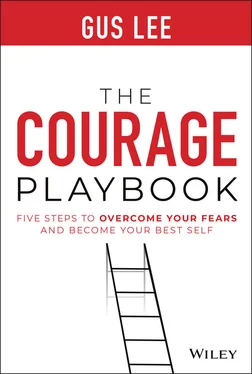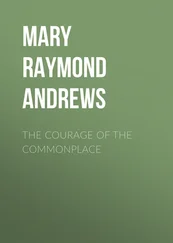Gus Lee - The Courage Playbook
Здесь есть возможность читать онлайн «Gus Lee - The Courage Playbook» — ознакомительный отрывок электронной книги совершенно бесплатно, а после прочтения отрывка купить полную версию. В некоторых случаях можно слушать аудио, скачать через торрент в формате fb2 и присутствует краткое содержание. Жанр: unrecognised, на английском языке. Описание произведения, (предисловие) а так же отзывы посетителей доступны на портале библиотеки ЛибКат.
- Название:The Courage Playbook
- Автор:
- Жанр:
- Год:неизвестен
- ISBN:нет данных
- Рейтинг книги:4 / 5. Голосов: 1
-
Избранное:Добавить в избранное
- Отзывы:
-
Ваша оценка:
- 80
- 1
- 2
- 3
- 4
- 5
The Courage Playbook: краткое содержание, описание и аннотация
Предлагаем к чтению аннотацию, описание, краткое содержание или предисловие (зависит от того, что написал сам автор книги «The Courage Playbook»). Если вы не нашли необходимую информацию о книге — напишите в комментариях, мы постараемся отыскать её.
The Courage Playbook: Five Steps to Overcome Your Fears and Become Your Best Self,
The Playbook
The Courage Playbook
The Courage Playbook
The Courage Playbook — читать онлайн ознакомительный отрывок
Ниже представлен текст книги, разбитый по страницам. Система сохранения места последней прочитанной страницы, позволяет с удобством читать онлайн бесплатно книгу «The Courage Playbook», без необходимости каждый раз заново искать на чём Вы остановились. Поставьте закладку, и сможете в любой момент перейти на страницу, на которой закончили чтение.
Интервал:
Закладка:
How would you advise Bella Cruz? Fear impairs good decision making. Tier 4 can help us identify and then discard fear's worst impulses.
Bella asked me, “But, Gustavo, isn't fear a great motivator?”
“Yes, it is. But it's not a good one.”
Author Daniel Pink found that the stick of fear, even with the promise of the carrot, kills intrinsic motivation and spurs negative behaviors, cheating, and unethical practices. 6 Wharton Professor Andrew Carton finds that fear momentarily motivates, and leads to destructive paralysis, deep demoralization, personal health problems and then, as we'll see, invites ultimate failure. 7
Yet fear has an important use. Gavin de Becker points out that fear warns us of dire physical threats. But without training, our simple fears can turn us into victims by making us panic and freeze. 8 Humans who did not behaviorally train themselves to face fear became predator food. The Playbook isn't a physical survival guide against criminals, mountain lions, or grizzlies; it's a practice handbook for becoming our courageous selves in a modern jungle of our anxieties.
Here's an example. Let's say that your work team is asked to give inputs on the selection of a critical vendor. Your team leader might respond in one of the following ways depending on the Tier in which they operate.
Tier 1: I always need more power and will die before I share it. People? They're just things to exploit, threaten, and harm. I'll go into rages and fire people who try to lead.
Tier 2: I always have to control others and will seldom share my power. People are things; I use them to get what I want. I give in to anger, belittle, criticize, dispirit, depend on hand puppets, and demote those who try to be leaders.
Tier 3: I try to know my stuff and survive by going with the majority and the flow. I do deals and favors to get results and look the other way when I see or hear Tier 1 and 2 actions.
Tier 4: I always try to do the right thing and am miserable when I don't. I help others and don't complain when I'm disrespected. I promote warm, universal respect, forgiveness, and teamwork.
Author Robert Gilbreath wrote that we can be free of endless confusion by simply asking which of our choices is right in “the moral frame.” As “moral” can be a hotly loaded term, let's do a quick time‐out and take a cool look at its definition: Moral means to be “concerned with principles of right and wrong and the goodness or badness of human character; holding or manifesting high principles for proper conduct; sanctioned by or operating on one's conscience or ethical judgment.” 9 That's not too painful. The definition pulls us from our passions and biases toward weighing our actions with a cool and clinical look at doing the right thing.
This has a particular focus on how we relate to humans. In this consideration, as we'll later see, there is nearly universal agreement.
If the number “one” customarily represents something at its best, why, in Tier 4 GPS Tool, does Tier 1 describe us at our worst? It's because courage is a progressive competence. We're working on Step One to reach Step Five. In discerning the best actions, we begin at Tier 1's malignant selfishness to progress through better options to reach the heroic moral ideal of Tier 4.
I said that we can start using the Tier 4 Tool by asking: What are my fears in this situation?
Gary fears that Aiden will sink a key project. Deep down, he fears he'll be seen as ineffective, which could harm his career. Bella's afraid of failing her patients, her staff, and her boss, and of losing her job. Deep down, she fears her children will go hungry.
What do you fear?
Our answers give us our first look at what we call the River of Fear. More on that later.
We then ask ourselves four questions—one in each Tier.
Tier 1: Malignant drive for power. What's the very worst reactive thing I could do? Attila the Hun might say: Destroy every human being in my path . The tyrannical individual does the worst things imaginable to exert power over others and get their way. It's fear controlling our lowest, most inferior, self‐serving, narcissistic hungers. Scarlett O'Hara, a slave‐owner with a Civil War–ruined plantation in Gone with The Wind, fiercely vows with a clenched fist, “I'm going to live through this, and when it's all over, I'll never be hungry again—no, nor any of my folks! If I have to lie, steal, cheat, or kill!” This is the Tier 1 manifesto and we see this in violent parents and criminals and cheating executives.
In Tier 1, people say, “I'll crush anyone to get my way,” to include lawbreaking, sexual crimes and harassment, racism, extortion, discrimination, bribery, threats, fraud, theft, abuse, domestic violence, and murder. They then deny responsibility and take vengeance against those who don't cave in to their will. Tier 1 people reward a few blindly obedient people of similarly deficient character with money and position. When they punish, they are often brutal.
Tier 1 social groups operate on fear and power. Spouses have little independence and children are commonly disrespected, tyrannically controlled, and abusively neglected.
Tier 2: Compelling self‐interest. What's the worst thing I can do without breaking a law? The hated, toxic, controlling manager threatens a rival; coerces employees using unwarranted criticism and bullies, intimidates, deceives, manipulates, steals credit, and micromanages for control, status, money, and personal gain. This person does everything short of criminal activity to get their way.
In Tier 2, people say, “I'll do whatever it takes and I'll do what I want when I feel like it,” from being biased, breaching ethics, lying, backstabbing, and disrespecting to faking data and inflating stats. Tier 2 is Tier 1 with lip gloss or a bow tie. In Tier 2, people deny responsibility, blame others, and justify their ditching of ethical and organizational standards by saying, “Everyone else does it.” Many Tier 2 people, often using rationalizations and justifications, believe that these are right choices.
Tier 2 family groups are often overly controlled. Spouses can become unduly compliant. Children can be forgotten or driven to overachieve to satisfy parental expectations. Appearing to be normal, happy, and content is more important than the inner reality of their lives.
Tier 3: Benign self‐interest: success via results. What do I have to do to not fail? This person tries to survive in a harshly competitive world. Tier 3 people struggle for results and success. They try to please those in power, are often yes‐people, quickly take credit, make no waves, avoid controversies and conflicts, look away when others are being harmed, curry approval and seek comfort, and are perpetually worried and stressed. A minority of them work hard; most just try to get by. Individuals in Tier 3 see themselves as “good people” who won't do wrong. But neither will they stand for principles, choosing to be “nice” in moral situations instead of courageously and respectfully doing the right thing, face‐to‐face.
In Tier 3, bending to their fears, people say, “What can you do? It'll never change.” “Don't fight City Hall.” “He doesn't want to hear that.” “People don't change.” “Really, it's none of my business.” “Let them take care of it.” “He was asking for it, anyway.” “Thankfully, I don't have to take responsibility.” “It's not the right time to bring it up.” “We're not covering things up—we're protecting the integrity of our [family or organization].” “I'm not being dishonest—I'm just discreet.” “I'm not a coward; I'm just conflict avoidant.”
Читать дальшеИнтервал:
Закладка:
Похожие книги на «The Courage Playbook»
Представляем Вашему вниманию похожие книги на «The Courage Playbook» списком для выбора. Мы отобрали схожую по названию и смыслу литературу в надежде предоставить читателям больше вариантов отыскать новые, интересные, ещё непрочитанные произведения.
Обсуждение, отзывы о книге «The Courage Playbook» и просто собственные мнения читателей. Оставьте ваши комментарии, напишите, что Вы думаете о произведении, его смысле или главных героях. Укажите что конкретно понравилось, а что нет, и почему Вы так считаете.












